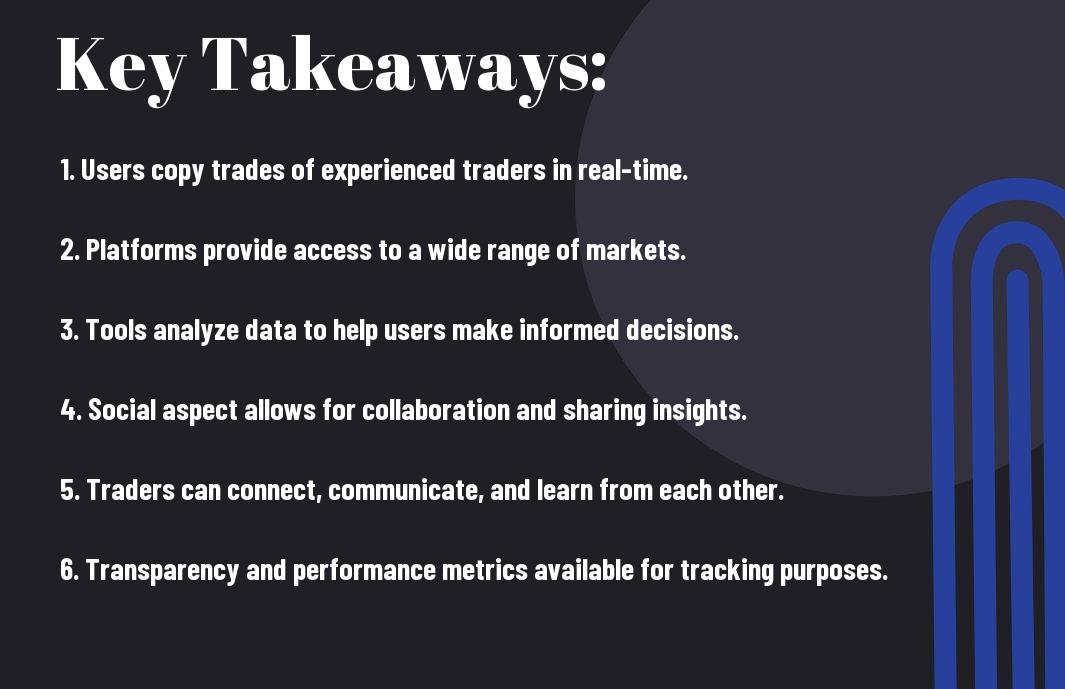You might find yourself intrigued by social trading platforms and tools, wondering how they operate. Social trading platforms allow you to interact with other traders, get insights, and even automatically copy their trades. These platforms harness the power of collective intelligence, letting you benefit from the expertise of the crowd. By using these tools, you can access a wealth of trading information and make more informed decisions based on the actions of others in the community. Let’s investigate into how these platforms and tools function to elevate your trading strategies.

Key Takeaways:
- Social Trading Platforms: Social trading platforms allow users to follow, copy, and interact with other traders in a community setting.
- Copy Trading: Users can automatically copy the trades of successful traders on social trading platforms, eliminating the need for manual decision-making.
- Tools and Features: Social trading platforms offer tools such as performance metrics, risk management tools, and social feeds to help users make informed trading decisions.

What are Social Trading Platforms
An
Definition and History
A social trading platform is an online service that allows you to connect with other traders, share trading ideas, and even automatically copy the trades of successful investors in real-time. These platforms combine social networking with trading, creating a community where you can interact, learn from others, and potentially profit from their expertise. The concept of social trading dates back to the early 2000s when the first platforms started to emerge, revolutionizing the way people approach investing.
Key Features and Benefits
Platforms with social trading capabilities offer a range of features and benefits that can enhance your trading experience. Some key features include:
- Copy trading: Automatically replicate the trades of successful traders
- Social networking: Connect with other traders, share strategies, and learn from each other
- Transparency: Access to real-time performance data of top traders
These platforms can help you improve your trading skills, diversify your portfolio, and potentially increase your profits. Assume that you are a novice trader, social trading platforms can provide you with valuable insights and guidance to kickstart your investment journey.
An
Understanding the Key Features and Benefits
Social trading platforms offer a unique opportunity to engage with a community of traders, share knowledge, and benefit from collective wisdom. By participating in these platforms, you can access a wealth of information, strategies, and trading opportunities that you might not have discovered on your own. Some additional key features include:
- Risk management tools: Set limits on how much you are willing to invest or risk
- Performance tracking: Monitor the success of your trades and adjust your strategy accordingly
Assume that you are looking to enhance your trading skills and stay informed about the latest market trends, social trading platforms can be a valuable resource for you.

How Social Trading Platforms Work
There’s a reason why social trading platforms are gaining popularity among investors and traders. These platforms work by leveraging network effects and community building to create a collaborative environment where users can share insights, strategies, and trades with each other in real-time.
Network Effects and Community Building
Network effects occur when the value of a platform increases as more users join and engage with the community. Social trading platforms tap into this phenomenon by connecting traders from around the world, allowing them to follow each other, communicate, and learn from one another. As the community grows, so does the pool of knowledge, expertise, and trading opportunities available to you.
Real-time Market Data and Analytics
Work on social trading platforms is facilitated by providing real-time market data and analytics to help you make informed trading decisions. These platforms offer a variety of tools and resources such as live price feeds, technical analysis charts, market news updates, and performance statistics of top traders. By having access to up-to-date information, you can stay on top of market trends and react quickly to changes in the market.
To fully take advantage of real-time market data and analytics, you can set up custom alerts and notifications to receive updates on specific assets or trading signals that match your preferences. This feature allows you to stay informed even when you’re not actively monitoring the platform, ensuring that you never miss out on important market movements.
Copy Trading and Risk Management
One of the key features of social trading platforms is copy trading, which allows you to replicate the trades of successful and experienced traders in real-time. By following and copying the trades of top performers, you can benefit from their expertise and potentially generate profits without having to make trading decisions on your own. Additionally, these platforms often provide tools for risk management, such as stop-loss orders and risk allocation settings, to help you protect your capital and manage your overall portfolio risk.
The ability to automatically replicate trades from expert traders while implementing risk management strategies can help you diversify your portfolio, reduce the impact of emotional decision-making, and potentially improve your overall trading performance.
Types of Social Trading Platforms
All social trading platforms can be categorized into three main types: manual trading platforms, automated trading platforms, and hybrid trading platforms. Each type has its unique features and benefits that cater to different trading styles and preferences. Below is a breakdown of these types:
- Manual Trading Platforms
- Automated Trading Platforms
- Hybrid Trading Platforms
Manual Trading Platforms
Any trading platform falls under the manual category when you have full control over the trading decisions. You can analyze the market trends, study various indicators, and execute trades manually based on your strategy. These platforms often provide a range of tools and resources to assist you in making informed decisions, but the ultimate choice of when to buy or sell rests with you.
Automated Trading Platforms
Automated trading platforms, on the other hand, rely on algorithms and software programs to execute trades on your behalf. These programs are designed to follow predefined rules and criteria, allowing you to set parameters for when to enter or exit trades. By automating the trading process, you can take advantage of market opportunities 24/7 without constantly monitoring the markets yourself.
Another crucial aspect of automated trading platforms is that they can backtest strategies using historical data to assess their performance before risking real capital. This helps you fine-tune your trading strategy and optimize it for better results in live trading conditions.
Hybrid Trading Platforms
Social trading platforms that fall under the hybrid category combine manual and automated features, offering you the flexibility to switch between the two based on your preferences. These platforms typically allow you to copy other traders’ strategies while also giving you the option to execute trades manually or through automation.
Social trading platforms provide a diverse range of tools and functionalities to cater to various trading styles and preferences, making it easier for you to participate in the financial markets and potentially grow your investment portfolio.
Plus, these platforms often foster a community of traders where you can interact, share insights, and learn from others to improve your trading skills and strategies. They create a collaborative environment that can enhance your trading experience and help you achieve your financial goals more effectively.
Assume that you are interested in learning more about the different types of social trading platforms, you can check out the guide on What Is Social Trading and How Does It Work for additional information.
Tools and Features of Social Trading Platforms
After reading more about social trading on Social Trading: Everything You Need To Know, you may realize the importance of performance metrics and rankings on social trading platforms.
Metrics
These tools allow you to assess the track record and success rates of different traders. Performance metrics such as win ratio, average profit/loss per trade, and maximum drawdown can help you make informed decisions about which traders to follow. Rankings often highlight the top-performing traders on the platform, giving you a starting point to identify potential leaders to follow.
Sentiment Analysis and Market Insights
Platforms offering sentiment analysis and market insights provide valuable information on market trends, trader sentiment, and popular trading assets. The tools analyze social media, news, and other sources to gauge market sentiment and provide insights into potential trading opportunities. By staying informed about market sentiment and trends, you can make more educated trading decisions and adjust your strategy accordingly.
Risk Management and Stop-Loss Tools
Platforms with risk management and stop-loss tools help you mitigate potential losses and manage risk effectively. These tools allow you to set predefined risk levels, stop-loss orders, and take-profit levels for your trades. By utilizing these tools, you can establish clear risk parameters and protect your investment capital. Furthermore, risk management tools enable you to automate certain risk management tasks, providing additional peace of mind while trading.
The performance metrics, sentiment analysis, and risk management tools available on social trading platforms are designed to empower you to make informed trading decisions, manage risk effectively, and optimize your trading strategy. By utilizing these tools, you can enhance your trading experience and potentially improve your trading performance.
Benefits of Social Trading Platforms
Despite the risks involved in trading, social trading platforms offer several benefits that can help you navigate the markets more efficiently and effectively.
Access to Diverse Trading Strategies
Access to diverse trading strategies is one of the key benefits of using social trading platforms. By connecting with other traders on these platforms, you have the opportunity to learn about and follow a wide range of trading strategies used by experienced investors. This access can help you diversify your trading portfolio and potentially improve your overall trading performance.
Real-time Market Information and Analysis
To make informed decisions in the fast-paced world of trading, having access to real-time market information and analysis is crucial. Social trading platforms provide you with up-to-date data, market news, and expert analysis that you can use to stay on top of market trends and make timely trading decisions.
By leveraging real-time market information and analysis available on social trading platforms, you can seize profitable trading opportunities quickly and adjust your strategies in response to market developments.
Community Support and Learning Opportunities
For those new to trading or looking to enhance their skills, community support and learning opportunities offered by social trading platforms can be invaluable. By engaging with a community of like-minded traders, you can seek advice, share insights, and learn from others’ experiences in the markets.
A supportive trading community can help you stay motivated, gain new perspectives on trading strategies, and access educational resources to deepen your understanding of the markets.
Risks and Challenges of Social Trading Platforms
Market Volatility and Risk Exposure
For those engaging in social trading, market volatility and risk exposure are primary concerns. Since social trading involves copying the trades of others, you are exposed to the same market risks as the traders you follow. This means that if the market experiences sudden fluctuations or downturns, your investment may be at risk. It is important to carefully consider the risk level of the traders you choose to follow and diversify your portfolio to mitigate exposure to any single trader’s decisions.
Information Overload and Analysis Paralysis
To successfully navigate the world of social trading, you must learn to manage the vast amount of information available to you. With numerous traders sharing insights, tips, and strategies, it can be easy to suffer from information overload and analysis paralysis. You may find yourself overwhelmed by conflicting advice or unsure about whose trades to follow. Developing a clear strategy, setting specific goals, and filtering information based on your trading style can help you make more informed decisions.
The key is to strike a balance between staying informed and avoiding information overload. Focus on filtering and prioritizing information that is relevant to your trading goals and risk tolerance. By doing so, you can enhance your decision-making process and avoid feeling overwhelmed by the sheer volume of information available on social trading platforms.
Dependence on Platform Performance
With social trading platforms, your success is closely tied to the platform’s performance and reliability. Since your trades are executed through the platform, any technical glitches or downtime could potentially impact your ability to enter or exit trades promptly. It is crucial to choose a reputable and stable platform with robust security measures to safeguard your investments and ensure a seamless trading experience.
It is recommended to regularly monitor the platform’s performance and stay informed about any updates or changes that may affect your trading activities. By staying vigilant and proactive, you can minimize the risks associated with dependence on platform performance and make informed decisions about your investment strategies.
Another Title
Text for another subsection…
Summing up
On the whole, social trading platforms and tools work by allowing you to connect with other traders, share insights, and learn from each other’s strategies. These platforms feature a variety of tools such as copy trading, social news feeds, and performance metrics to help you make informed decisions. By leveraging the wisdom of the crowd, you can potentially improve your trading skills and outcomes.
Q: What is a social trading platform?
A: A social trading platform is an online service that allows investors to follow, interact, and copy the trading activities of other traders. Users can view the trades and performance of top traders on the platform and choose to replicate their strategies.
Q: How do social trading tools work?
A: Social trading tools provide users with access to a community of traders where they can share insights, analysis, and trading ideas. These tools also offer features such as copy trading, where users can automatically copy the trades of successful traders in real-time.
Q: What are the benefits of using social trading platforms and tools?
A: Some benefits of using social trading platforms and tools include access to a network of experienced traders, the opportunity to learn from their strategies, the ability to diversify investment portfolios, and the convenience of automated trading through copy trading features.


